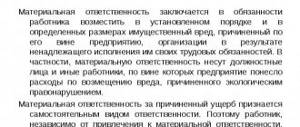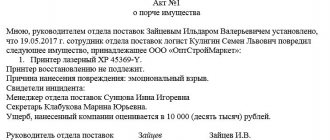Traditionally, financial responsibility is associated with labor relations, and to a greater extent with the responsibilities of employees. Upon careful consideration of the issue of causing damage by action or inaction, one can see that according to the Labor Code of the Russian Federation, such liability is, first of all, mutual, and when establishing it, it is necessary to adhere to the principle of equality of parties.
Financial liability - what is it in simple terms
Important! Please keep in mind that:
- Each case is unique and individual.
- A thorough study of the issue does not always guarantee a positive outcome. It depends on many factors.
To get the most detailed advice on your issue, you just need to choose any of the options offered:
- Use the online chat in the lower corner of the screen.
- Call: Federal number: +7 (800) 511-86-74
From the point of view of labor legislation, financial liability is a mutual obligation of the employee and the employer to compensate for the damage caused by one of the parties.
Material damage can be understood as:
- direct destruction or loss of property;
- reduction in the value of inventories as a result of the guilty actions of one of the parties (damage to valuables);
- disclosure of information causing losses;
- loss of property belonging to third parties, but transferred to the employer for safekeeping;
- theft of valuables of the employer or client.
From the point of view of labor legislation, only real damage can be considered; lost profit is not subject to compensation, Art. 238 Labor Code of the Russian Federation. The conditions for the occurrence of financial liability are described in detail in Section XI of the Labor Code of the Russian Federation. In addition, the obligation to take care of the valuables used in the work process is listed as fundamental in Art. 21 and Article 22 of the Labor Code of the Russian Federation.
Types of financial liability
The method of compensation for damage caused is directly dependent on how it is stipulated in the employment contract. Existing types of liability are classified according to:
- subject and volume of compensation - the employee’s obligation is differentiated, the employer’s - for the most part, full;
- number of subjects – individual and collective;
- method of compensation - by agreement, one-time document or court decision.
Labor legislation gives the employer the right to demand material compensation for damage caused, but does not oblige him to do this when each such fact is identified, Art. 240 Labor Code of the Russian Federation.
About labor relations
Labor relations are regulated by the Labor Code of the Russian Federation. In accordance with Article 21, every citizen has the right to own a workplace, which must meet state standards and safe working conditions. All this must be reflected in the collective labor agreement.
It also provides for compensation for harm that may occur during the performance of work duties, including compensation for moral damage. Labor relations imply that you need to treat both the property of employers and employees with care. Article 238 of the Labor Code of Russia establishes the liability of a citizen who causes damage directly to the employer’s property, as well as the damage that the employer is forced to compensate to third parties due to the fault of the employee. An example of an employee’s financial liability will be given below.
Conditions for the occurrence of financial liability
As a general rule, an employee’s liability for material damage caused to the company does not occur automatically, even if the amount is established and proven. In order to hold the hired person accountable under a written agreement or under a one-time document (acceptance certificate, paper on safekeeping, invoice or inventory), several essential conditions must be present:
- the damage is actual in nature (hypothetical losses within the framework of labor relations are not considered)
- guilt in the actions (inaction) of the employee or criminal intent;
- proven cause-and-effect relationship between harm and the employee’s actions (memos, inspection materials, inventory data, video surveillance materials);
- lack of evidence that the person responsible has made every effort to avoid or reduce the amount of damage;
- the injured party has made a claim for compensation (voluntary or compulsory).
From the point of view of liability, the existence of an agreement on the obligation to compensate for the full amount of damage caused significantly reduces the duration of the procedure and the number of its stages. But even in the absence of a special clause in the employment contract or a separate agreement with the employer, the hired person will not be able to avoid full responsibility (Article 243 of the Labor Code of the Russian Federation) if:
- the damage was the result of intent;
- the employee caused the destruction of property while intoxicated (alcohol, drugs, toxicological);
- material damage was caused as a result of an offense;
- the damage was not caused during the performance of labor functions (this case does not fall under the Labor Code of the Russian Federation and will be considered from the point of view of general legislation - civil or criminal).
If these conditions exist for the onset of financial liability, minors can be brought to it, but only in court, because the conclusion of agreements with them on full liability is not provided for by law, Article 242 of the Labor Code of the Russian Federation. It must be taken into account that in cases of intentional harm, the Labor Code will not protect even pregnant women.
Functions of the agreement on mat. responsibility
The employer trusts one of the employees with the safety of his property, and he, acting in accordance with his official duties, monitors its safety.
Caring for the integrity of his property, and as a person interested in its rational and correct use, the employer enters into a contract or agreement with such employee (employees) on full mat. liability (Article 244 of the Labor Code of the Russian Federation). An example of a liability agreement is in our material.
An agreement of this type is concluded for the purpose of:
- Increase the degree of employee responsibility for property that does not belong to him.
- Collect compensation in full for the damage caused by the employee.
The law does not oblige employers to draw up such agreements; this is one of the rights of the employer. However, if there is no such agreement, then even if the employee’s guilt is proven and obvious, the employer will be able to recover from him the amount of damages caused, which is no more than his average monthly salary (Article 241 of the Labor Code of the Russian Federation).
The principle of financial responsibility
The essence of material liability in labor legislation is more fully revealed if we highlight the principles of its imposition:
| Principles of attraction | The essence |
| Reciprocity | The level of responsibility for the employee should not be higher than for the employer. |
| Holding parties accountable only as a result of labor relations | Compensation for damage will be considered through the prism of the Labor Code of the Russian Federation only if the parties are united by an employment contract, and the fact of damage is related to the performance of work duties. If there is no such agreement between the parties, then we will not be talking about material damage, but about property damage under the Civil Code of the Russian Federation (the same applies to those who perform work under the Civil Code). |
| Guilt | It is possible to oblige a party to restore what was lost only if there is irrefutable evidence of the guilt of the actions. The employee’s recognition can also serve as confirmation. |
| Accounting for direct actual damage | The employer is required not only to investigate and prove guilt, but also to determine the amount of destroyed or damaged property in monetary terms. |
| Possibility of reaching an agreement on the form and timing of repayment of obligations | The guilty party can compensate for the damage both in money and by providing similar serviceable property. The issue of repayment of the established debt in amount, form and terms can be agreed upon with the employer. The Labor Code of the Russian Federation reserves the right to refuse the debt claim. |
| Justice | It is possible to force payment for causing material harm, for example, in the case of collective liability, only to those whose participation in this is fully proven. If a person was absent from work that day, then it is impossible to hold him accountable for the damage caused, even if he signed a general document on full (team) responsibility. |
Deadlines
Issues of financial liability are considered within the scope of the provisions of the Labor Code only in cases where the damage was caused as a result of the performance of work duties. Anything committed outside of the company or working hours must be classified according to civil and criminal law. However, this does not mean that a former employee cannot be held accountable after the termination of the working relationship with him.
As insurance, the employer can use Article 392 of the Labor Code of the Russian Federation, which provides for the opportunity to apply for compensation one year after the fact of material damage has been identified and the perpetrators have been identified. This right is also confirmed by Article 232 of the Labor Code of the Russian Federation, which states that termination of a rental agreement does not terminate the right to receive compensation for damage caused during cooperation.
For the employee, the danger lies in the fact that checking the integrity of supplies and property may not occur on the day of dismissal, but much later. Theoretically, each business entity must conduct an inventory annually no later than the end of the year, before drawing up final reports, Order of the Ministry of Finance No. 49. So the time frame for filing claims can extend up to two years after the dismissal of a specialist.
Hired persons who, according to the Government's list, are among those with whom it is allowed to conclude an agreement on the full financial responsibility of the employee, should know that upon dismissal, the employer is obliged to conduct an unscheduled inventory of the area entrusted to the specialist in order to identify shortages. If, according to the results of an extraordinary inspection, all valuables were available and in good condition, then the financially responsible person can be relatively calm.
The period for applying for compensation for damage is one year from the date of establishing the value of the lost valuables and the perpetrators, Art. 392 Labor Code of the Russian Federation.
Target
In addition to returning the value of stolen or damaged valuables, financial liability pursues the achievement of a number of other goals:
- restoration of lost property (money, property or other agreed means);
- educational function - the inevitability of punishment helps the parties to be more attentive to their own responsibilities under the Labor Code of the Russian Federation;
- legal meaning - parties can only count on full compensation if they comply with the procedures established by law, otherwise this right will be lost.
Limits
Article 242 of the Labor Code of the Russian Federation allows the employer to assign full responsibility to employees for the values entrusted to them. This can be done immediately when signing an employment contract, draw up a separate agreement during the work process, or issue an order to assign additional responsibilities to a person.
Essential in this case will be the clause that only representatives of certain professions from the list of positions related to the maintenance of funds or the preservation of inventory can be held fully liable, Art. 244 Labor Code of the Russian Federation. For these purposes, the Ministry of Labor of the Russian Federation, by its Resolution No. 85, approved a list of professions and types of work, as well as samples of contracts on full individual and collective financial responsibility.
For those with whom the contract has not been concluded, the limits of financial liability are established by Art. 241 of the Labor Code of the Russian Federation - no more than one average salary, calculated according to the rules of Art. 139 Labor Code of the Russian Federation. In addition, Art. 248 of the Labor Code of the Russian Federation limits the period for receiving even this amount of compensation by way of simple deduction from the settlement amount - this right can be exercised only within a month from the date the fact and amount of damage caused is established. If deadlines are missed, the employer can recover compensation only through the court.
Samples of a standard form of an agreement on full collective (team) financial liability and individual liability can be viewed here.
Concept and essence
Financial liability is the obligation of the employee to compensate the employer for the damage that the company received as a result of his actions.
Moreover, it does not matter whether these actions were committed intentionally or through negligence.
To determine a specific measure and lawful application of punishment, the employer must establish and prove:
- the direct fact of damage;
- the employee committed a misdemeanor or illegal act that led to its receipt;
- the presence of a causal relationship in the employee’s behavior (his actions or inaction) during the labor process when damage is caused;
- its specific size;
- availability of documentary evidence that financial liability has been established against the employee (this is only necessary in certain cases).
To determine all these points, the employer must conduct an audit of the employee’s work behavior that led to the damage. In some cases, a special commission is created for this purpose, which includes relevant company specialists.
The employee is required to provide a written explanation for his actions or behavior that caused the damage.
In case of refusal, the employer draws up a corresponding act. Although the deadline for this is not directly established, by analogy with disciplinary liability for material liability, it is also considered equal to two days.
Most often, it is accompanied by other types of liability: disciplinary, administrative, criminal, as well as deprivation of bonuses or remuneration. But their use does not exclude the possibility and right of the employer to apply financial liability.
Its legislative regulation is carried out by the Labor Code, namely Chapter 39 of the Labor Code of the Russian Federation. In particular, it contains articles establishing the employee’s obligations to compensate the employer for the damage caused, the procedure and limits for imposing a penalty, as well as circumstances precluding the possibility of its application.
Special attention should be paid to the types into which this responsibility is divided.
The employer's right to refuse to collect damages from the employee
Circumstances of damage to property or loss of part of the inventory may be taken into account during internal proceedings. To do this, when carrying out measures to establish the extent of damage, it is customary to require an explanation from the employee for his actions (inaction). If justifiable factors are discovered, the employer has the right to refuse the claim for compensation in whole or in part, Art. 240 Labor Code of the Russian Federation. In this case, management can be guided by the following considerations:
- small amount of damage;
- the life circumstances and material conditions of the offender;
- position of the property owner (may be contained, for example, in a collective agreement).
If the responsibilities at a new place of work are inextricably linked with the need to maintain and store the company’s values, understanding the individual intricacies of the concept of financial responsibility will not be superfluous for anyone applying for a position. But even if the future specialty is not mentioned in the List of the Ministry of Labor, do not forget that the obligation to monitor the safety of the employer’s property is written down as one of the main ones in Art. 21 of the Labor Code of the Russian Federation, and full financial liability can occur even without a signed agreement about it.
Zinovieva Natalya Igorevna
Lawyer at the Legal Defense Board. Specializes in handling cases related to labor disputes. Defense in court, preparation of claims and other regulatory documents to regulatory authorities.
What are the types of mat. responsibility?
All employees have financial liability to the employer. However, it has different types:
- Limited, in which a mating agreement is not concluded. liability, the employer can recover damages from the employee, but in a limited amount. Collection from an employee of an amount greater than that established by law only through the court.
- Fully customized. The employee bears the corresponding responsibility. The amount of property assigned to the employee is easily specified, and it is possible to control it. An example of a full liability agreement is available.








